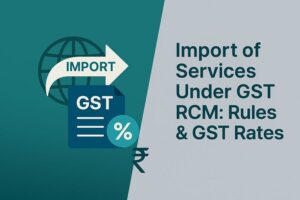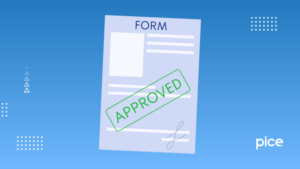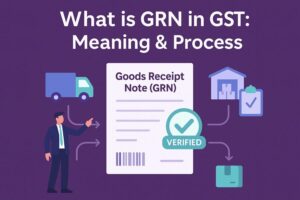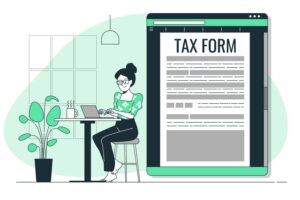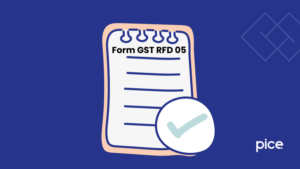How to File Professional Tax Return in GST?
- 17 Dec 24
- 10 mins
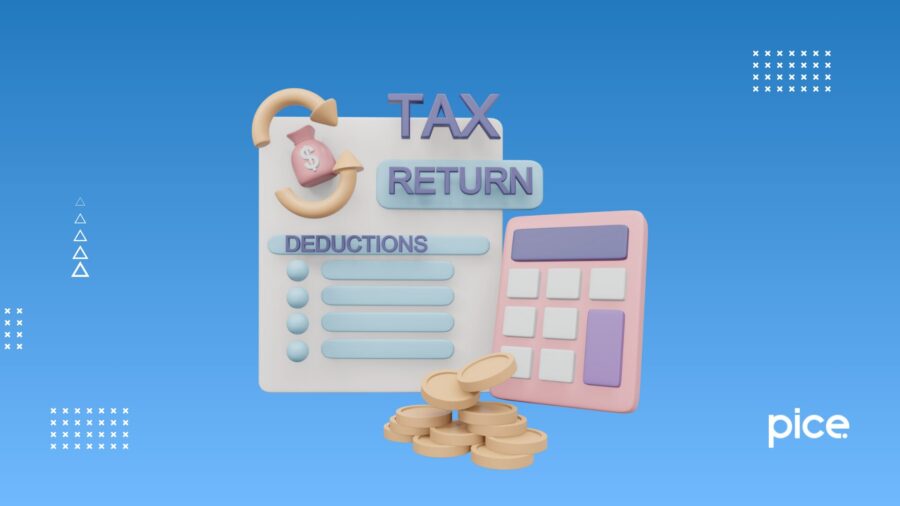
How to File Professional Tax Return in GST?
- What Is a Professional Tax?
- What Is the Professional Tax Rate?
- Who Collects Professional Tax?
- Who Has to Pay Professional Taxes?
- How to Pay Professional Tax? Is Any Return to be Filed?
- Who Is Exempt from Professional Tax?
- What Are the Consequences of Violating Professional Tax Regulation?
- Which Indian States Apply Professional Tax/Return?
- What Are the Benefits of Professional Tax Registration and Return Filing?
- Documents Required for Professional Tax Return Filing
- Procedure for Professional Tax Return Filing
- Procedure for Obtaining a Professional Tax Registration Certificate
- Conclusion
Key Takeaways
- Professional Tax is a state-imposed tax on professionals, freelancers, and employees based on income.
- Employers handle PT filing for employees, while freelancers must file independently.
- Exemptions include individuals with disabilities, senior citizens, and certain charitable institutions.
- Non-compliance leads to penalties, interest, and legal consequences.
- Filing PT returns ensures compliance, avoids penalties, and improves creditworthiness.
Professional tax (PT) is essential for working professionals to file as a part of their tax liability. If you are an employee in an organisation, your employer will be responsible for deducting and filing this tax on your behalf. On the other hand, you need to file returns for your professional tax.
Learn how to file professional tax returns in GST here.
What Is a Professional Tax?
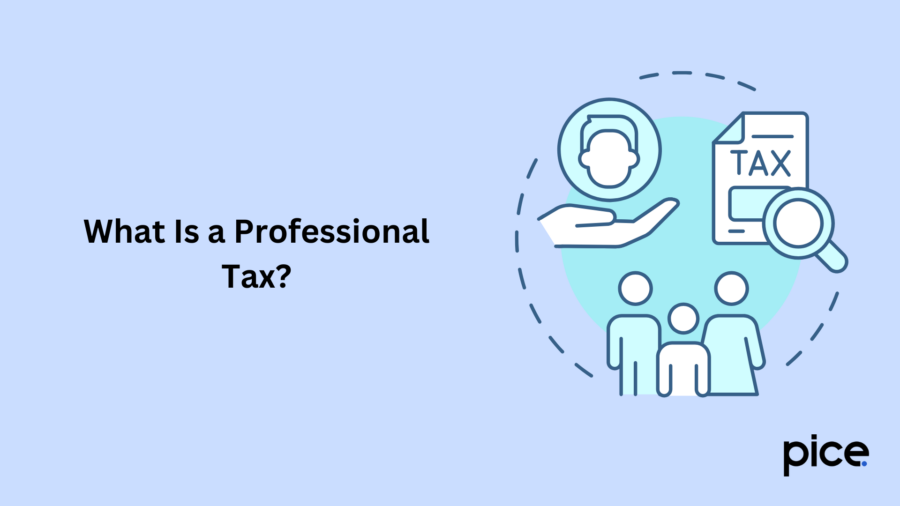
Certain state governments levy professional taxes on all professions, including employment and trade, based on income. Professionals and freelancers further need to pay PT if their income exceeds a certain monetary threshold (if any).
The Article 246 of the Constitution of India gives Parliament the exclusive power to make laws on matters in the Union List, including income taxes. States can only make laws related to the concurrent and state List.
However, professional tax is a type of income tax that is levied by state governments.
PT is deducted from the taxable income of professionals under the provisions of the Income Tax Act, 1961.
What Is the Professional Tax Rate?
The PT rate, levied by the state governments, varies based on state-specific rules and regulations. However, the state governments follow a specific slab system of income to levy PT. As per Article 276 of the Indian Constitution, the state governments are allowed to charge a maximum limit of ₹2,500 as PT from any working person.
Professional Tax Rate Slabs
Each state determines the professional tax slab rate based on the taxpayer's income. As a result, taxpayers need to follow the regulations set by the state’s legislation for professional tax return filing. However, usually, the PT slab rate is as follows:
- Monthly income not exceeding ₹15,000
- Monthly income between ₹15,001 to ₹25,000
- Monthly income exceeding ₹25,000
Who Collects Professional Tax?
The Commercial Tax Department of each state is responsible for collecting PT from the working people. This helps raise funds for the municipal corporations of each state.
Who Has to Pay Professional Taxes?
Here are the authorities responsible to pay professional taxes:
- If you are an employee, your employer needs to deduct and pay PT to the state government. However, the employer needs to follow the state’s legislation pertaining to the monetary threshold.
- Employers such as corporates, sole proprietorship firms, partnership firms and others further need to pay PT for their profession or trade. Thus employers need to obtain a PT registration certificate and a professional tax enrolment certificate. Employers need the former certificate to pay their PT while the latter to deduct and pay PT from their employees. In addition, employers might require separate registration for each of their offices based on the state’s legislation.
- Freelancers need to register themselves to pay PTs if their monetary income threshold exceeds the limit provided by the state’s legislation.
Notably, there are certain exemptions to levying PTs based on the state’s laws. For instance, the Karnataka State Government allows Karnataka professional tax exemptions to parents and guardians of individuals with mental disability, permanent or visual disability.
How to Pay Professional Tax? Is Any Return to be Filed?
PT is a direct state-level tax that professionals need to pay to their respective state governments. As a result, the way to pay professional tax varies from one state to another. Further, you can pay PT online or offline.
To pay PT online, you need to visit the official website of your state government. Online filing and payment of PT helps you avoid visiting the relevant authorities in your state. However, if you are a salaried individual, your employer will deduct and remit professional tax based on your income slab.
Who Is Exempt from Professional Tax?
Here are the classes of individuals exempted from paying PT:
- Member of Force (Governed by Army, Air Force or Navy Act)
- An individual suffering from mental or physical disability such as deafness or blindness
- Parent of a child with a disability
- Charitable hospitals below the taluk level
- Individuals running an educational institute to teach classes up to 12th standard or pre-university
- If a state employs a foreign individual, he/she will be exempted from paying PT.
- Individuals above 65 years
- Women agents of Government’s Mahila Pradhan Kshetriya Bachat Yojana
What Are the Consequences of Violating Professional Tax Regulation?
The following are the consequences of violating PT regulations:
- If you fail to register for PT when the state’s legislation is applicable, you might have to pay a penalty. However, the amount of penalty or the penal interest varies based on the state.
- Penalties apply when a professional or an employer fails to make payments for professional tax within the due date. In addition, if you fail to file returns within the specific date, you might have to pay penalties subject to the state’s legislation.
For instance, the Maharashtra Government levies a penalty for failure to register within the due date amounting to ₹5 per day. The government further imposes 1.25% to 2% monthly interest for late payment of professional tax. A 10% penalty applies on the tax amount for delay in payment or non-payment. The applicable penalty for late submission is ₹1,000.
Which Indian States Apply Professional Tax/Return?
Here are the states and a union territory where PT applies:
| Andhra Pradesh | Assam | Bihar |
| Chhattisgarh | Gujarat | Karnataka |
| Kerala | Madhya Pradesh | Maharashtra |
| Manipur | Meghalaya | Mizoram |
| Nagaland | Odisha | Punjab |
| Rajasthan | Tamil Nadu | Telangana |
| Tripura | Uttar Pradesh | West Bengal |
What Are the Benefits of Professional Tax Registration and Return Filing?
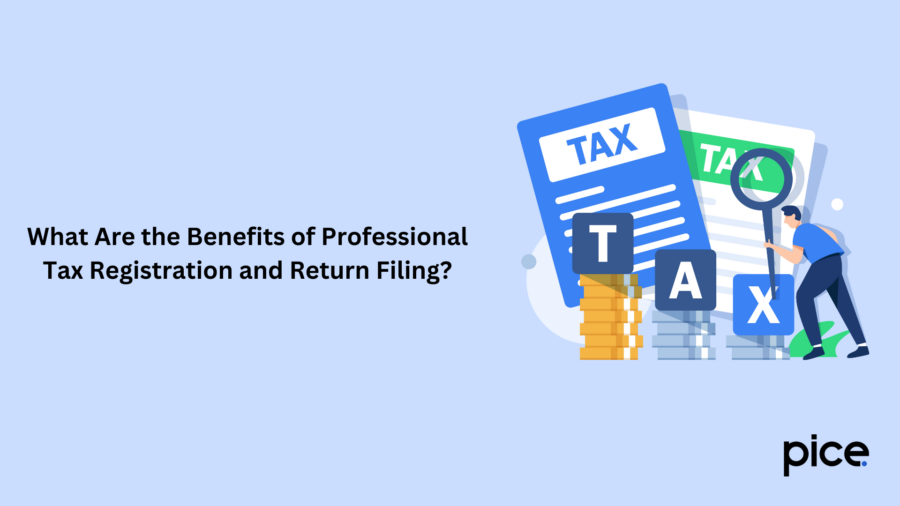
The following are the benefits of PT return filing:
- Avoiding Penalties and Legal Consequences
As a taxpayer, you can avoid paying penalties and adverse legal consequences by paying your PT return on time. Ensure you pay your tax liability within the due date to avoid a penalty and legal implications.
- Compliance with Applicable Laws
Filing professional tax returns helps taxpayers comply with applicable laws and regulations. As a result, you can avoid adverse legal issues.
- Improved Creditworthiness
If you file PT returns within the due date, it contributes to maintaining a clean tax record while improving your creditworthiness. Thus, you can avail credit facilities from a range of banks and financial institutions seamlessly.
- Access Social Security Benefits
You can avail social security benefits without any hassle if you file PT returns on time. These social security benefits include pension, medical insurance and other government welfare schemes.
- Easy and Convenient
Choosing to file a professional tax annual return online can help you avoid offline filing and visiting the concerned authority. Thus, you can experience an easy and convenient process.
- Increased Revenue for the Government
Filing a professional tax return helps you meet your tax liabilities. Moreover, you can contribute to an increased revenue for the government. The government can utilise these funds collected for welfare activities to improve social conditions.
Documents Required for Professional Tax Return Filing
Here are the documents that you need to file a PT return:
- PAN card
- Aadhaar card
- Voter ID card or passport
- Bank account details
- Income proof or salary details
- Registration certificate or shop and establishment certificate
- Challans or payment receipts for PT payment
- Details of TDS (tax deducted at source) from the salary.
Procedure for Professional Tax Return Filing
The procedure to file a PT return filing varies from one state to another. However, the common steps are as follows:
- Obtain the Professional Tax Registration Certificate
You need to obtain a PT registration certificate from your state authority.
- Determine the Applicable Slab and Rate
Professional tax slabs and rates differ based on the state. Ensure you determine the slab and rate applicable based on the income level and the profession.
- Collect the Necessary Documents
You need to collect all the required documents for PT payment. These documents include payment proof for taxes, salary or wage slips.
- Prepare the Return
Ensure you follow the format for GST filing as provided by the state authority.
- Submit the Return
Ensure you submit the necessary documents while filing your professional tax return to the state authority.
- Pay the Tax
You need to pay any due PT along with your PT return. Ensure you avoid late filing to prevent penalty payment.
- Obtain Acknowledgement
Ensure you collect acknowledgement of the return filing and the tax payment that you make.
Procedure for Obtaining a Professional Tax Registration Certificate
Here are the steps to obtain a PT registration certificate:
Step 1: Submit the application form along with the required documents to the state government and a copy of the same to the tax department.
Step 2: The tax authority will scrutinise the application to confirm if the information presented is correct.
Step 3: On successful scrutiny of the documents, the authority will issue the PT registration certificate.
Conclusion
Filing PT return is essential for taxpayers to avoid penalties and adverse legal issues. Knowing how to file professional tax returns in GST is essential when complying with tax laws in your state. If you are a professional or freelancer, ensure you pay and file your PT returns within the due date provided by your state authority.
💡If you want to streamline your payment and make GST payments, consider using the PICE App. Explore the PICE App today and take your business to new heights.
 By
By 





